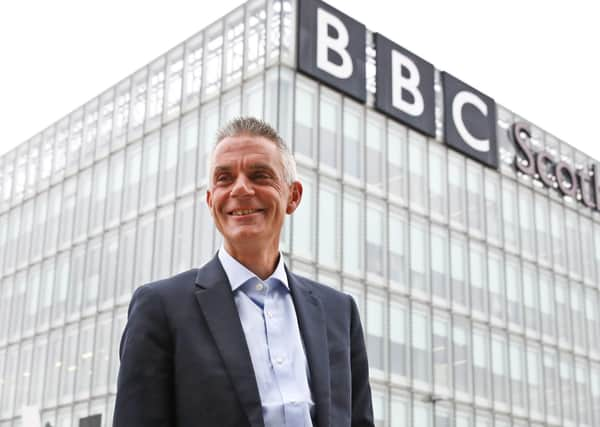BBC doesn’t need pro-Government comedians - it needs working-class ones: Anthony Clavane


The Government doesn’t need too much help in this regard.
Nevertheless, the guffawing clearly needs to be clamped down on. As Conservative MP Ben Bradley explains: “In recent years lots of BBC comedy shows are just constant left-wing rants about the Tories and Brexit. If the BBC is to truly represent all licence fee payers, that needs to change.”
Bradley’s outburst followed news that the corporation’s new director-general, Tim Davie, was considering axing comedy programmes like The Mash Report, Have I Got News For You and Mock the Week. These shows, apparently, promote a “left-wing” view of the world.
Advertisement
Hide AdAdvertisement
Hide AdNo they don’t. They tend to promote, at times, an anti-establishment view of the world. Political comedy is supposed to take pot-shots at the powerful. To punch up rather than down. To poke fun at the rulers rather than the ruled.
Davie’s arrival at New Broadcasting House was, itself, comedy gold. Wearing, according to one insider, “bad trainers and classic dad jeans”, the former Pepsi marketing man strode into the building as if he were auditioning for the latest series of spoof sitcom W1A. With the vultures circling, the man who once stood as a Tory councillor in London – and who will be paid £525,000 a year – reportedly wants a “greater diversity of voices” in the channel’s comedy coverage.
Laugh? I nearly choked on my Tofu Avocado Sandwich.
Let’s put aside the, er, coincidence that Davie will soon be negotiating with the Government about the future of the licence fee.
And the fact that it was one of the aforementioned ‘Commie’ shows that helped endear Boris Johnson to the British public.
Advertisement
Hide AdAdvertisement
Hide AdAnd that Tracey Ullman regularly angered Jeremy Corbyn’s followers with her lampoons of the ex-Labour leader.
Let’s instead look at the word “diversity”, which is code here for getting more “right-wing” comedians on shows. Normally it is used, quite rightly, to increase opportunities for Black, Asian, and ethnic minority performers.
Listening to Woman’s Hour, earlier this week, it struck me that we hear little about another marginalised group whose numbers also need boosting.
It was a special Bank Holiday edition celebrating 40 years since Educating Rita was first performed.
Advertisement
Hide AdAdvertisement
Hide AdWilly Russell’s masterpiece is about a Liverpudlian hairdresser’s desire to broaden her horizons by taking an Open University course.
It remains a funny and moving story of social mobility.
Four decades ago, I was working as an usher at Leeds Playhouse and saw many new shows.
They were written by working-class writers such as Russell, Alan Bleasdale and Andrea Dunbar and often starred working-class actors like Walters, Ian McKellen and Judi Dench.
Walters surprised Garvey by pointing out how much easier it was, back then, for people like her (her father was a builder, her mother a clerical assistant) to get into drama school. “I came from a working-class home where there were no books,” she said. “I studied drama. It was a great course. There were more from working class than middle class backgrounds. It’s completely the opposite now. I should think there are very few working-class kids in drama schools. They can’t afford it. Where are the working-class writers, the working-class actors and filmmakers going to come from?”
Advertisement
Hide AdAdvertisement
Hide AdLast week in The Stage, a new study revealed that only 16 per cent of people in the arts were from lower socio-economic backgrounds. Since Educating Rita made its mark, the creative world has been increasingly dominated by people from privately-educated backgrounds.
High audition fees to drama schools, a dearth of theatrical apprenticeships, the demise of higher education grants have all made it harder to “do a Rita” and become upwardly mobile.
The comedy industry has been hit hard by the pandemic. According to Sian Davies, who runs a crowd-funded show that champions working class stand-ups: “As the industry currently stands, we are in danger of losing these voices from comedy.”
The real problem with BBC comedy, as with the creative arts as a whole, is not the absence of pro-Government voices.
It’s the absence of working-class voices.
Support The Yorkshire Post and become a subscriber today.
Advertisement
Hide AdAdvertisement
Hide AdYour subscription will help us to continue to bring quality news to the people of Yorkshire. In return, you’ll see fewer ads on site, get free access to our app and receive exclusive members-only offers.
So, please - if you can - pay for our work. Just £5 per month is the starting point. If you think that which we are trying to achieve is worth more, you can pay us what you think we are worth. By doing so, you will be investing in something that is becoming increasingly rare. Independent journalism that cares less about right and left and more about right and wrong. Journalism you can trust.
Thank you
James Mitchinson
Comment Guidelines
National World encourages reader discussion on our stories. User feedback, insights and back-and-forth exchanges add a rich layer of context to reporting. Please review our Community Guidelines before commenting.